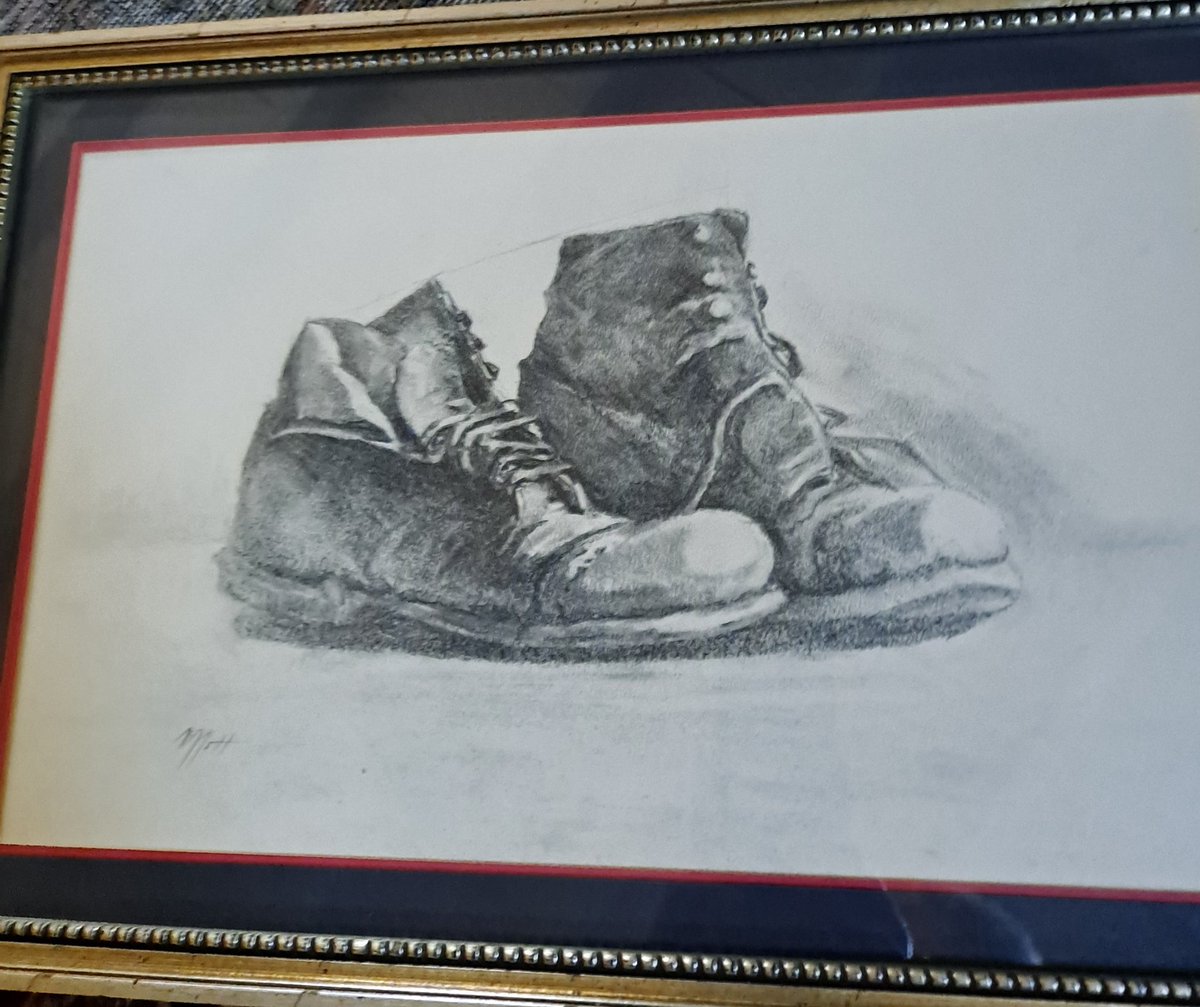
REMEMBERING A GRANDFATHER
First, a word about the charcoal drawing of the pair of old shoes. A friend, Kathleen, who is a poet shared the image with me and others who love her poems. Her parents purchased this drawing years ago in Denison, Texas. It is signed, “Mott” and the artist could be Clifford Mott. I cannot confirm that from my meager research. When I first saw it, my grandfather leaped to life in my mind as I saw him on his farm many years ago. He had a pair of those shoes which he took off on the closed-in, back porch before entering the spotless, farm kitchen. Those shoes saw years of hard labor in the field and barn, in good weather and bad, in walking fence lines and herding livestock. My grandfather was a big man, not only in size but in heart and soul too. I wanted to grow up and be like him and another model, his son, my father.
William Elden Gruber, son of John Henry Gruber and Lucinda Freel, was born on Oct 9, 1886. He died on May 2, 1971. My clear memories of him are from spending time on my grandparents’ farm from 1940 through 1955. I learned the meaning and value of hard work, saw a productive partnership up close, and had the freedom to while away hours of play in a stream and fields, in a big barn. I also got to know various animals, including cows, horses, sheep, pigs, chickens and guinea fowl. These animals provided food as well as income. It’s hard for me to think of my Grandpa Gruber, in terms of 137 years since he was born and now gone for 52 of my 86 years. He was 84 when he died prior to his 85th birthday. I recall not being able to get back from the East to Ohio for his funeral because I was in the midst of the final days of completing a second Master’s degree. We attended a memorial service recently of a dear friend via YouTube streaming, hardly thought of in 1971.
What I remember about my grandfather on his farm was his daily commitment to the farm chores, to feeding and caring of animals, to planting and harvesting, to maintaining machinery. He subscribed to early to bed, early to rise philosophy and practice. He demonstrated his unwavering love and support of my dear grandmother, who preceded him in death by 19 years. She was an active partner on the farm, tending the large garden and her flock of chickens that produced eggs and chickens to eat which she killed and cleaned herself,
My grandfather remained on the farm and gradually surrendered the work in his later years for a retired life of leisure and enjoyment. He loved baseball and the Cincinnati Reds and going to town to visit with his friends.. Another side note about my grandmother, the inveterate farm wife who was a great cook for all of us who gathered there for Sunday dinners, often ten or twelve around a big table of home-grown delights. These were self-sufficient farmers who provided most of their own needs and shared with many in their extended family. My grandmother was clear in her expectations of all of us which included good work, good habits and good speech. I once let a bad word slip, and she washed my mouth out with 99.9% pure Ivory soap. What a metaphor for clean speech!
My grandfather’s uniform was a denim shirt, a pair of Big Mac bib overalls and those shoes, or sometimes rubber boots depending on the job at hand, and a hat or cap appropriate for the season. In cold weather, he wore a wool-lined denim jacket. I wanted each of those and badgered my parents into buying them for me so that I could feel like I fit in on the farm. I called my shoes “clodhoppers.” That term came from 1690s, slang, “one who works on plowed land, a rustic,” from clod (n.) + agent noun from hop (v.). Compare in a similar sense clod-breaker, clod-crusher; in this word perhaps a play on grasshopper. I think in another life I would have had a farm like that and would have tried to be as productive and giving as my grandfather.
I tested his patience more than a few times as he taught me how to drive a tractor and to contribute to work that had to be done year-round although a bit slower in winter. Both he and my father embodied the Protestant work ethic indicating the religious importance attached to laboring at one’s job. The Protestant, or Puritan, work ethic places a high value on productivity and frugality and places a negative value on those who do not work hard and try to succeed at their job. That was clear to me from an early age. If any phrase described my grandfather better than productive and frugal I would not know what it could be, other than loving his family and doing what he did. That was a great life lesson for me.
One final story about my grandfather. He was part of a small community of neighboring farmers who often shared with one another in various ways, whether helping to plant and harvest or to repair or build something or to trade ideas for improvements. They cared about and for each other in various ways. After my grandfather retired and in his later years, his nearest neighbor, less than a mile away, always looked each morning to be sure he turned on the light. It was a signal between them. One morning, the light was not on. His light had gone out and he had died in his sleep. We should all be so blessed.
